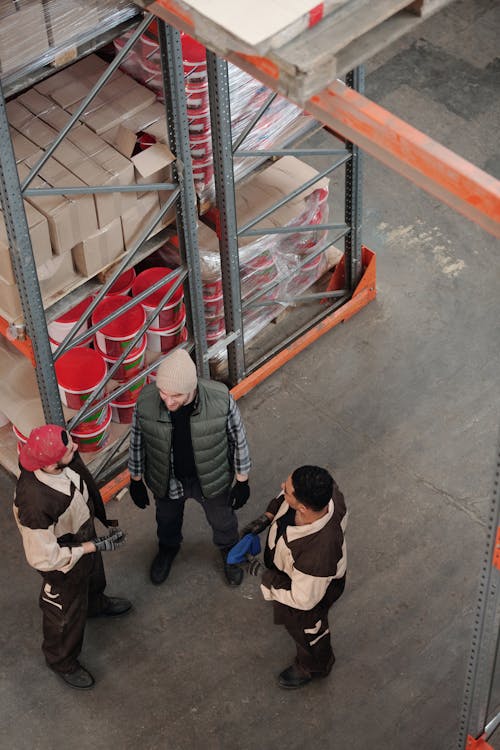Logistic Agents play a crucial role in helping companies.
Logistic Agents are essential in assisting companies to create tailored solutions that address the unique needs of different industries.
As the competition in the global market rises and becomes more unforgiving, more and more firms are seeking logistics solutions that address their needs and requirements. That is why flexibility or the ability to provide the client with a unique solution has become especially significant for logistics companies. Regardless of whether it is retail business, healthcare, manufacturing sectors or companies in the food and beverages sectors, logistics companies need to present customized solutions in order to fit the needs of every sector.
Logistics customization entails breaking down the complexity of each sector of logistics by identifying the unique concerns a client may have such as the handling of specific products or services or even the time it used to transport the products. Central to this is the activities of the logistics agent who is close to both the logistic provider and the client in order to ensure the suitable and appropriate strategies are established and adopted.
This article analyzes the strategies which are used by the logistics companies when providing more personalized approaches to fit the particular industry demands more closely and focuses on the function of the logistic agent in this process.
The Importance of Customization in Logistics
Every industry is unique and has unique logistic needs despite the fact that it may be in the same sector as another industry, say medical industry logistics will be different from manufacturing or retailing industry’s logistics. In the future, logistics providers will be expected to diversify their services toward fulfilling the various and unique requirements presented by the supply chain industry. Customization is important for several reasons:
Improved Operational Efficiency: By coming up with solutions for the current challenges, specific logistics providers are able to unclog the cluttered system, in addition to reducing the time taken to deliver. For example, route planning or designing packaging that is unique to the industry can enhance the procedures.
Enhanced Client Satisfaction: Outsourcing of logistics services must contain solutions that fit certain industry needs of the clients to the letter. This satisfies the customers, and therefore opens the way for long term business partnerships and brand loyalty.
Competitive Advantage: This has the effect of providing companies with greater competitive advantage in an industry where factors such as cost control, and customer satisfaction are the most important determinants of success.
The Role of the Logistic Agent in Customizing Solutions
Among all the parties involved in the process of car customization it is possible to name the logistic agent as one of the most vital ones. These logistic agents have direct communication with both the transporter/service provider and the buyer of the transporter’s services in defining the most optimum solutions for the requirements of a certain industry. These are at liberty to decipher the dynamics of the client’s industry, design strategies, and enforce those strategies right across the value chain.
The logistic agent’s role includes:
Customizing Service Offerings: Specificity of each industry – this means that in each field there are certain logistic difficulties which it is necessary to come across. For instance the food and beverages require a certain temperature to be maintained during transportation while the healthcare sector requires a specific form of secure transport that meets its compliance and requirements for sensitive products such as pharmaceuticals. A logistic agent evaluates such situations and guarantees that the provider has the ability to deal with them.
Customizing Service Offerings: Once the logistic agent learns of the needs of his or her client then they liaise with the logistics company to customize services. This could include designing of special packaging techniques, redesigning of the warehouse layout or even incorporating the tracking mechanisms in real time. Logistics serves as the enabling factor and the agent ensures that any aspect of logistics meets the particular needs of the client.
Monitoring and Managing the Supply Chain: The logistic agent provides real time tracking of the supply chain for implementation of the researched customized solutions. They monitor KPIs, carry out data analysis and feedback to make some corrections where necessary. And this helps to ensure that the logistic operation of the client is well facilitated through efficiency.
Communication and Coordination: The key players in the supply chain management and the major communicating partners of the client with the logistics providers are the logistic agents. They manage every aspect of the supply chain and also make sure that the client’s needs are met in real time. The logistic agent negotiates, is involved in learning and managing key issues and providing utterances that make both parties to understand each other.
Customizing Logistics Solutions for Specific Industries
Logistics can be defined on the basis of industry standards set for various industries. Some of the ways logistics companies can adapt to provide more precise services to the sectors include: The logistic agent is used in providing services to meet the requirements of the sectors as will be illustrated below
- Retail and E-commerce
This sector is vital to the retail as well as e-commerce businesses since these companies mainly depend on the logistics firms for delivery, stock supply, and final delivery to the end consumers. This growth of e-commerce has put a lot of pressure on couriers and delivery services to deliver products within the shortest time possible. To meet the unique needs of retail and e-commerce clients, logistic agents can implement the following solutions:
Optimized Last-Mile Delivery: Last mile delivery is arguably the most important area of the retail supply chain. A logistic agent serves the logistics provider by ensuring the delivery routes for the goods are the shortest possible so that the goods may reach the customers.
Inventory Management: Logistic agents can benefit e-commerce companies to reduce the cost of streamlining inventory through tracking real time and auto-reordering. This cuts on stockouts and enables the client to make enough stock to meet his or her needs.
Scalability: This is so because many retail and e-commerce organizations never have stable or constant customer traffic or sales volume, especially during festive seasons or other special occasions. Logistic agents are useful in order to ensure that GSAs have the capacity to scale up the volume of the providers without any hitches.
- Healthcare and Pharmaceuticals
Healthcare and pharmaceutical sectors need very specific solutions in terms of logistics where a variety of medical, devices and pharmaceuticals need to be transported safely and within compliance rules. logistic agents working with these industries must ensure that:
Compliance with Regulations: The healthcare products are greatly sensitive to handling, storage and even transportation because they are mostly regulated products. logistic agents thus ensure that their logistics providers are conversant with these regulations, for example the Food and Drug Administration (FDA) or GDP guidelines.
Temperature-Controlled Solutions: Some of the pharmaceutical products need to be subjected to certain temperatures so that they can remain effective. As highlighted in the work, logistic agents are performing a significant function with regard to making sure that the logistics company delivers cold chain solutions with the products in the right range of temperature as they take their respective trips.
Secure and Safe Handling: Medical devices as well as the pharmaceutical products in most of the instances have high value or are sensitive. logistic agents make sure these security measures are in place to prevent shrinkage, adulteration or pilferage of these goods in transit.
3. Manufacturing and Automotive
The manufacturing and automotive industries call for just-in-time or JIT delivery systems that call for errands that are made at the time the component is required in production. Logistic agents working with these industries focus on:
JIT Delivery: Logistic agents work in parallel with manufacturing companies to make sure that the whole logistics of discrete parts and components is done in order to supply the manufacturing line at the right time that they are needed. This helps to reduce costs of inventory and also makes the production line flow very well.
Bulk Transportation: Transportation of large and heavy and bulk goods is a common characteristic that is well met by the automotive and manufacturing industries. Logistic agents thus design transport solutions for evacuation of these out requirements using special vehicles and equipment for carriage of over sized goods.
Supply Chain Visibility: Some of the manufacturing clients require visibility of all activities in the supply chain. Logistic agents are involved in the provision of real time tracking information of shipments so that manufacturers can change their work plans with regards to shipment status and disposition.
- Food and Beverage
The food and beverage industry is arguably one of the most logistics – sensitive industries especially because it involves fast, accurate and, in most cases, temperature-sensitive products. Logistic agents involved in food logistics must ensure that:
Cold Chain Solutions: Given this, food products may have to be conveyed in cold chain systems to enhance the shelf life of the products. Logistic agents are specifically appointed to oversee the provision of cold chain logistics solutions to storage all the way to transportation.
Compliance with Food Safety Standards: Food products also have to meet legal requirements provided by the Food and Drug Administration plus the United States Department of Agriculture. Logistic agents are there to ensure that the logistics providers are adhering to these regulations and the standard practices of handling and cleaning the equipment.
Quick Turnaround Times: Food items are usually delicate and may spoil hence making the turnover rate to be very important. Logistic agents mainly center on decreasing transit time, increasing speed and decreasing time that is taken for food products to get to their desired place in the least possible time.
The Role of Technology in Customized Logistics
Logistics solutions are most often used and are very significant in terms of being anchored on technology. Logistics agents get to use complex technologies including analyzing data, automation, and IoT to create improved and personalized services. Some examples of how technology is used include:
Real-Time Tracking: The agents who are accompanied by the GPS and IoT sensors makeup Logistic so that they can track shipment, giving the clients all-time visibility of their goods.
Data Analytics: Through the examination of information on delivery time and route, inventory, the Logistic agents learn of the possible alterations and make suggestions to logistics providers on how they could improve on their performance.
Automation: Logistic agents can engage agents to assist in installing automated systems for warehousing, order processing and inventory elimination of oversights.
Best Practices for Offering Customized Logistics Solutions
To successfully offer customized solutions to different industries, logistics companies and their Logistic agents should follow these best practices:
Invest in Industry Expertise: Logistic agents should be trained and knowledgeable as to the niches they deal with. The nature of the industry and its trends have to be understood to offer the best and the most suitable services.
Collaboration and Communication: The logistic agent must be able to keep the lines of communication between the client as well as the logistics provider open. This keeps the solutions in feedback to the client’s changing needs by regular feedback and updates.
Flexibility and Scalability: There is high dynamism that makes logistics companies have to be adaptable and scalable to cater for clients’ fluctuating needs. Logistic agents help to ensure that the users of logistics services are able to manage their demand and supply and they do this in an efficient manner that seeks to take into account the supply and demand of the logistics services throughout the year.
Leverage Technology: There is a need for the logistic agents to incorporate the best technologies into the market so as to improve efficiency, transparency, and personalization. Technology can enhance the efficiency of doing business by increasing more precision, work at a faster pace as well as offering information on performance of the supply chain.
Conclusion
Analyzing the tendencies of logistic industries, it can be stated that they are faced with the problem of differentiation and specialization, which leads to a requirement of providing individual solutions for their clients. Logistic agents serve as strong pillars in the provision of numerous logistics services that meet the needs of various industries including health, production, Kirck, retail and food industries.
Based on learned customer issues, versatility and suitability of solutions, as well as the application of advanced technologies, logistic agents assist the logistics companies in delivering clients as much as possible and to be competitive in the market. Thus, customization can be considered as the unique requirement rather than the option for the logistics providers in order to be successful in today’s environment of increased business volatility.




